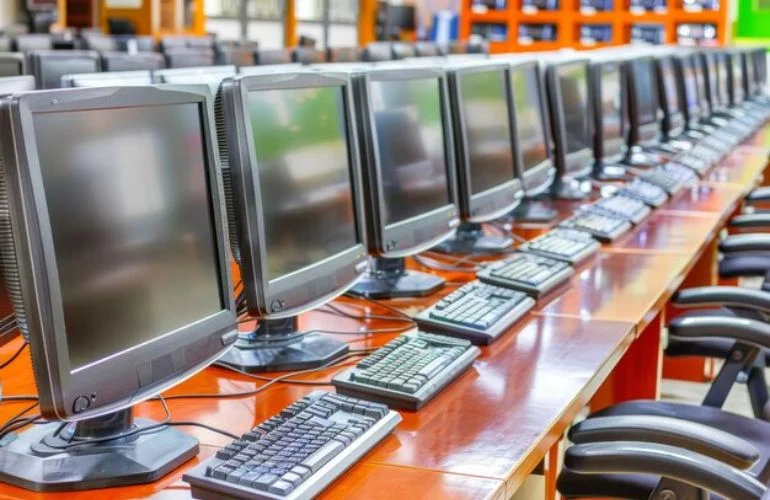HTA computers are a crucial part of the modern technological ecosystem, yet many people may not fully understand what they are or how they function. So, what exactly are high-tech systems, and why are they so important?
HTA stands for “Human-Technology-Application” computers, which are advanced computing systems designed to bridge the gap between human interaction, technology, and practical applications. These systems are often found in industries like healthcare, engineering, research, and manufacturing, where precision, efficiency, and the integration of complex systems are key. HTA computers enable seamless communication between machines and people, helping businesses and industries streamline tasks, improve productivity, and enhance decision-making processes.
At their core, high-tech systems are all about optimizing the relationship between humans and technology. Whether used for data processing, automation, or real-time analytics, these systems ensure that technology serves its intended purpose in the most efficient way possible.
Must read Why Do Checkout Computers Talk to You in Japan?
The Evolution of Human-Technology-Application Computers in Industry
HTA computers have their roots in the desire to improve the way humans interact with technology. As industries became more reliant on advanced systems and automation, the need for specialized computers that could handle intricate tasks and process large amounts of data grew. Over time, high-tech systems were developed to meet this demand, incorporating cutting-edge technology like artificial intelligence, machine learning, and sophisticated algorithms.
Today, high-tech systems are an essential component in many fields. In healthcare, for example, they are used to manage patient data, track medical records, and even assist in diagnostics. In the engineering and manufacturing sectors, HTA computers are used for tasks like 3D modeling, simulations, and automation of production lines. These systems allow industries to operate with greater precision and control, ensuring that human error is minimized and efficiency is maximized.

How Human-Technology-Application Computers Are Revolutionizing Healthcare
One of the areas where high-tech systems are making the biggest impact is healthcare. In an industry where quick and accurate decision-making can mean the difference between life and death, high-tech systems help medical professionals work more efficiently.
These systems can manage vast amounts of patient data, including medical histories, test results, and treatment plans. By organizing and processing this data in real-time, high-tech systems enable doctors and nurses to access critical information quickly, reducing the likelihood of mistakes and improving patient outcomes.
In addition, high-tech systems are being used in advanced diagnostics and treatment planning. For example, they can analyze medical images like X-rays or MRIs, helping doctors identify patterns and abnormalities that might be missed by the human eye. This kind of technology-driven analysis is particularly useful in complex fields like oncology, where early detection of diseases such as cancer can significantly improve survival rates.
Human-Technology-Application and the Future of Manufacturing
In the manufacturing industry, high-tech systems are playing an increasingly important role. As automation becomes more widespread, companies are relying on these systems to manage production processes, monitor machinery, and ensure that operations run smoothly.
One of the key benefits of high-tech systems in manufacturing is their ability to predict potential issues before they occur. By analyzing data from sensors and machines in real-time, these systems can identify signs of wear and tear or malfunctions, allowing maintenance teams to address problems before they result in costly downtime.
Furthermore, high-tech systems are used for automating repetitive tasks on production lines. This not only reduces the need for human intervention but also increases the speed and accuracy of production. In industries like automotive manufacturing, where precision is paramount, high-tech systems help ensure that every component is assembled to exact specifications.

Enhancing Decision-Making with High-tech systems
One of the most important functions of HTA is their ability to enhance decision-making processes. In industries like finance, engineering, and logistics, these systems can analyze large datasets, identify trends, and make recommendations based on the data.
For example, in the finance sector, high-tech systems are used to assess market conditions, evaluate risks, and recommend investment strategies. By processing vast amounts of financial data in seconds, these systems give analysts and traders the information they need to make informed decisions.
In engineering, Human-Technology-Application can simulate different scenarios, allowing teams to test new designs or processes before implementing them in the real world. This reduces the risk of costly errors and ensures that projects are completed on time and within budget.
The Future of Human-Technology-Application in AI and Robotics
As artificial intelligence (AI) and robotics continue to advance, HTA computers will play a crucial role in the integration of these technologies. HTA systems are already being used to control robots in industries like manufacturing, logistics, and healthcare. As robots become more intelligent and autonomous, high-tech systems will ensure that they can operate effectively alongside humans, making real-time decisions based on data and inputs.
For example, in the logistics industry, computers can control robots that sort and transport packages in warehouses. These systems use data from sensors to navigate complex environments, avoid obstacles, and optimize the flow of goods.
In the healthcare sector, robots controlled by HTA can assist in surgeries, delivering medications, or even providing companionship to patients. These applications have the potential to revolutionize the way healthcare is delivered, making treatments more precise and improving patient outcomes.
Conclusion
HTA computers are transforming industries by bridging the gap between human interaction and advanced technology. From healthcare to manufacturing and beyond, these systems are enabling businesses to operate more efficiently, make better decisions, and improve outcomes for their customers and clients.
As we move into a future dominated by AI, robotics, and big data, computers will play an even more critical role in ensuring that technology continues to serve humanity. The integration of these systems into everyday processes will not only enhance productivity but also revolutionize the way we work and interact with technology.
Understanding the importance of computers and their applications is key to appreciating how they will shape the future of various industries. Whether you’re in healthcare, manufacturing, or finance, computers are helping to create a world where humans and technology work together more seamlessly than ever before. Click here for more information.

What does HTA stand for in HTA computers?
HTA stands for “Human-Technology-Application.” HTA computers are designed to optimize the interaction between humans, technology, and their practical applications in various industries.
What industries use Human-Technology-Application?
Human-Technology-Application are widely used in healthcare, manufacturing, engineering, finance, and other industries that rely on advanced data processing, automation, and decision-making support.
How do Human-Technology-Application benefit healthcare?
In healthcare, Human-Technology-Application manage patient data, assist in diagnostics, and help medical professionals make faster, more accurate decisions. They can also analyze medical images and assist in treatment planning.
What role do HTA computers play in manufacturing?
In manufacturing, computers automate production processes, predict potential machinery failures, and ensure that operations run efficiently. They help reduce downtime and improve precision on the production line.
What is the future of Human-Technology-Application?
The future of HTA lies in their integration with AI and robotics. These systems will continue to enhance decision-making, control robots in various industries, and help optimize complex processes in real time.











